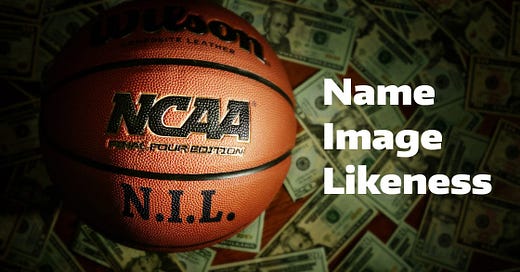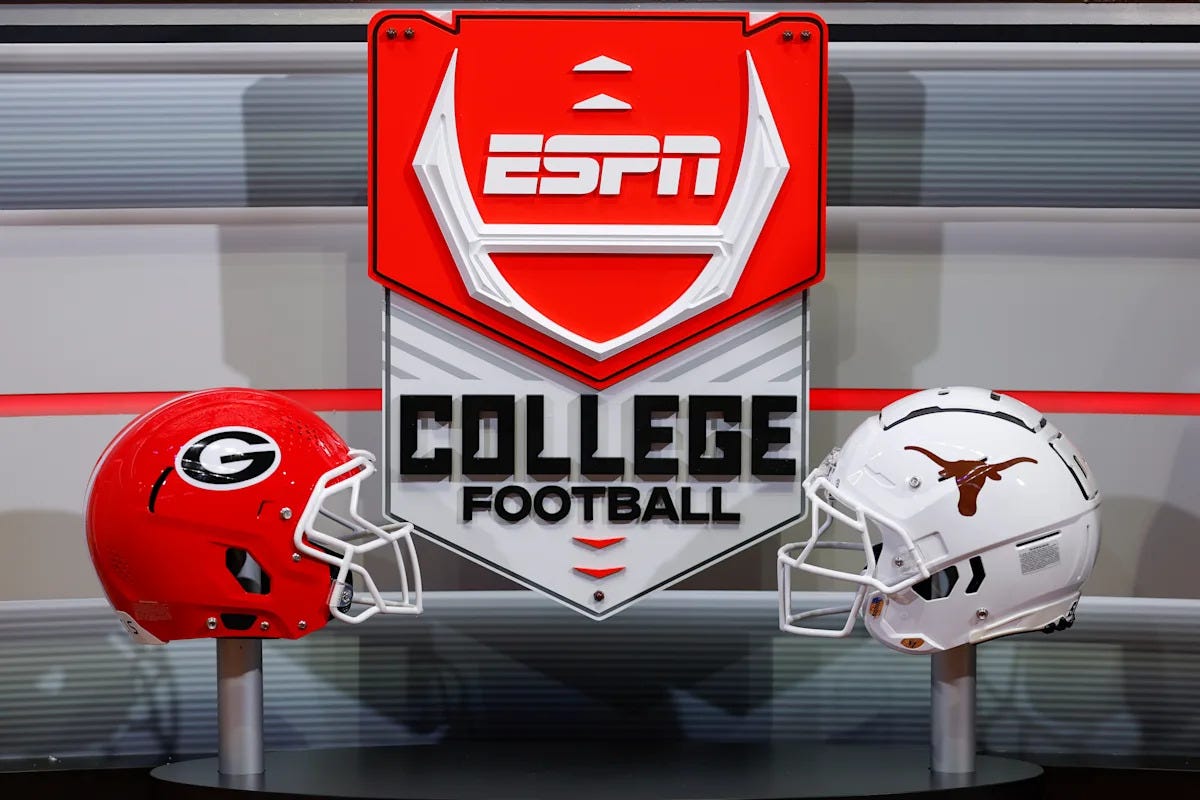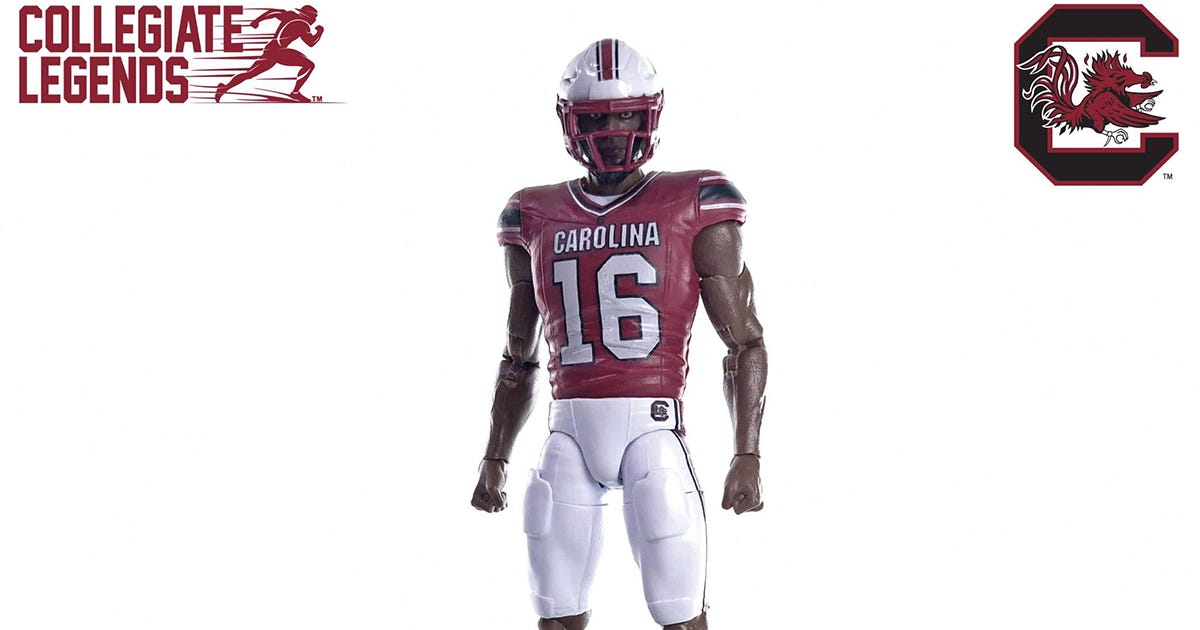Arizona JUCO Joins the NIL Landscape, ESPN's Media Rights Proposal for an Additional Conference Game in the SEC, & More | NIL Newsletter #327
Welcome to the NIL Newsletter by Optimum Sports Consulting - providing valuable, actionable NIL resources for athletes, administrators, agencies and other sport professionals.
Keep up to date on all of our newsletters and content by checking out past Optimum Sports Consulting Newsletters and following us on Twitter!
This Monday Newsletter Includes:
1. Arizona JUCO Becomes First in State to Offer NIL Opportunities
2. ESPN’s Proposal for Adding a Ninth Conference Game to the SEC Football Slate
3. How NIL Can Impact the Play Style of College Sports
4. South Carolina QB Gets an Action Figure
5. NCAA Eligibility Rules May Reach the Supreme Court
6. Legal Updates and What’s Coming Up for NIL
🏆Major News
Arizona JUCO Becomes First in State to Offer NIL Opportunities
Arizona Western College has become the first junior college in Arizona to officially allow student-athletes to monetize their name, image, and likeness (NIL).
The school’s move follows updated NJCAA guidelines allowing two-year schools to engage in NIL, a frontier previously dominated by NCAA programs.
Arizona Western partnered with Opendorse to facilitate athlete education and deal-making, joining over 200 schools across divisions using the platform.
School officials say NIL access could significantly aid recruitment, particularly for high-profile football and basketball players looking to transfer to four-year universities.
Athletic Director Jerry Smith emphasized that this initiative promotes both opportunity and responsibility for student-athletes.
Arizona Western’s decision signals a new era of NIL trickling down to community college levels, setting a precedent for other JUCO programs nationwide.
ESPN’s Proposal for Adding a Ninth Conference Game to the SEC Football Slate
ESPN is willing to pay an additional $50–80 million to the Southeastern Conference (SEC) to expand its conference slate from eight games to nine. This proposal has not yet been formalized, and the exact amount ESPN is willing to offer remains unclear.
The idea of expanding the SEC's schedule to nine games was discussed in the past but postponed, mainly due to the upcoming expansion of the College Football Playoff (CFP) to 12 teams and the additions of Oklahoma and Texas to the league.
The 2024 season marked the SEC's first season under its exclusive media rights deal with ESPN and ABC. The debut season was very successful, with eight of the 10 most-watched teams in college football coming from the SEC, strengthening ESPN's commitment to the conference.
SEC Commissioner Greg Sankey has expressed support for a nine-game conference schedule, citing its potential to increase interest among conference games. However, he emphasized that the move must not diminish other opportunities or negatively affect the CFP selection process.
Sankey highlighted that the expansion to a nine-game schedule is being carefully considered in light of how conference losses impact CFP selection. The SEC is analyzing how strength of schedule and the number of losses affect teams’ chances of making the 12-team Playoff.
Sankey indicated that the SEC may make a final decision regarding the nine-game schedule during the SEC Spring Meetings in Destin. He mentioned that gathering more information on CFP selection criteria and how losses are weighed is crucial before finalizing the schedule format.
Sankey emphasized the need for balance, stating that while a nine-game conference schedule could be beneficial, it must not result in fewer opportunities for teams to qualify for bowls or the CFP. The SEC aims to ensure that changes align with the broader goals of maintaining Playoff competitiveness.
📌Other Notable Stories to Follow
Shane Beamer Endorses Nick Saban as Co-Commissioner – South Carolina Football coach Shane Beamer endorsed Saban's potential role in leading the NIL commission proposed by President Trump. Beamer praised Saban's stature in college football and his leadership potential in shaping the future of the sport, indicating that Saban would be one of the first people he would consult regarding changes to the college football landscape. 🔗 LINK
How NIL Can Impact the Play Style of College Sports – UAB football coach Trent Dilfer highlighted the challenges NIL money presents for smaller universities compared to the more affluent Power Four programs. Dilfer explained that NIL disparities are influencing even the type of schemes or play calling he can run at UAB, specifically citing the difficulty in executing a specific defensive scheme due to the high cost of recruiting the necessary players. While UAB has $1 million in NIL funds for the entire team, schools like Texas have significantly larger budgets, making it hard for smaller programs to compete for talent and run certain defensive systems. 🔗 LINK
South Carolina QB Gets an Action Figure – LaNorris Sellers, South Carolina Quarterback, inked a NIL deal with Collegiate Legends to debut a custom action figure. The action figure is available at Gamecock Traditions and is also available for pre-order. The deal highlights one of the more interesting partnerships within NIL. Sellers intends on gifting some of the exclusive action figures to a group of local children. 🔗 LINK
The Big Ten’s Total Revenue Jump – In 2024, the Big Ten generated over $928 million in revenue. This was a 5.5% increase from 2023. The Big Ten distributed approximately $63.2 million to each of the 12 institutions. 🔗 LINK
Arkansas Basketball Player Signs with Reebok – Darius Acuff, an Arkansas 2025 signee, has signed a deal with Reebok. The deal follows Reebok’s recent investment in basketball behind President Shaquille O’Neal and Vice-President Allen Iverson. 🔗 LINK
Yeshiva Basketball Star Jumps into the NIL World without Social Media – Yeshiva Basketball Star, Zevi Samet enters into the NIL landscape without any social media. Following a religious decision to not be on socal media, Samet has decided to launch his own apparel collection in order to try and compete in a world that seems completely driven by social media presence. 🔗 LINK
📅What’s Coming Up Next for NIL
May 15: Deadline for schools to submit NIL compliance reports.
May 20: Launch of NIL Summer Training Program for student-athletes.
May 25: NIL Summit 2025 in Atlanta, Georgia
⚖️Legal Updates
NCAA Eligibility Rules May Reach the Supreme Court
Former Charleston basketball player Ante Brzovic was denied a preliminary injunction by a South Carolina federal court (4th Circuit) to play a fifth season after spending a year at a junior college.
The denial contrasts with a separate case involving Rutgers football player Jett Elad, where a New Jersey court (3rd Circuit) granted a similar injunction, highlighting inconsistent rulings on NCAA eligibility.
The dispute centers on whether the NCAA’s Five-Year Rule should be subject to antitrust law in the wake of the Supreme Court’s NCAA v. Alston decision.
Courts in different districts are split; some view the Five-Year Rule as a commercial activity subject to antitrust scrutiny, while others, like in Brzovic’s case, do not.
The lack of uniformity and clear precedent across circuits could push the issue to the appellate courts and potentially the U.S. Supreme Court.
The eligibility rules for JUCO athletes have been repeatedly challenged, with varying outcomes depending on the jurisdiction, including a successful injunction for Vanderbilt QB Diego Pavia.
Until a higher court rules definitively, NCAA eligibility decisions will continue to vary by district, leading to uncertainty for athletes seeking additional eligibility.
A Trump NIL Executive Order Could Create Chaos According to Some Legal Experts
Former President Donald Trump is reportedly exploring an executive order to address name, image, and likeness (NIL) compensation in college sports after speaking with former Alabama coach Nick Saban.
Sports legal analyst Michael McCann cautioned that such an order could cause “legal chaos,” as executive orders can’t override or dictate how states interpret their own laws.
McCann noted the order could interfere with the proposed House v. NCAA settlement, which aims to permit direct school payments to athletes and reshape the collegiate compensation model.
Any attempt by Trump to limit athlete compensation or deny athletes employee status would likely face legal challenges based on state law, equal protection, and First Amendment grounds.
The Wall Street Journal reported Saban didn’t seek to end NIL but suggested reforms, which Trump found compelling enough to ask aides to explore policy options.
McCann emphasized that while Trump could issue an executive order, it would likely create further instability rather than provide clarity or resolution in the already unsettled NIL landscape.
It remains unclear if Trump will follow through with an executive order, but legal experts expect any such move to complicate rather than streamline college sports policy.
Thanks for Reading!
Keep up to date on all of our newsletters and content by checking out past Optimum Sports Consulting Newsletters and following us on Twitter!









